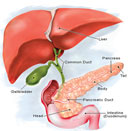
Pancreatic Cancer affects Blacks at higher rates
American Association for Cancer Research
• Cigarette smoking, over-weight/obesity increases this risk
• Blacks are at an increased risk for mortality
PHILADELPHIA, PA – Regardless of risk factors linked to pancreatic cancer, such as smoking and body mass index (BMI), Blacks experienced higher rates of pancreatic cancer death than whites.
“Reducing overweight/obesity and smoking will help reduce pancreatic cancer overall, as well as prevent other diseases,” said Lauren D. Arnold, Ph.D., M.P.H., postdoctoral research associate in the department of surgery at Washington University in St. Louis. ”We still have a long way to go towards understanding pancreatic cancer disparities.”
Results of this cohort study are published online in Cancer Epidemiology, Biomarkers & Prevention, a journal of the American Association for Cancer Research.
Pancreatic cancer is a rapidly fatal disease that is challenging for researchers to study and treat. Because there are no good screening tests and symptoms do not often appear until the disease has spread, Arnold said that most people die within two years of diagnosis.
Statistically, pancreatic cancer claims the lives of Black Americans more so than whites – between 2001 and 2005, Blacks had a 32 percent higher death rate, according to background information in the study obtained from the National Cancer Institute statistics.
Arnold and colleagues examined risk factors for pancreatic cancer and separately evaluated them among Black and white participants. Using data from the Cancer Prevention Study II (CPS-II), they assessed whether these risk factor patterns explained differences in incidence and mortality. CPS-II is a longitudinal study that originally enrolled more than one million participants in 1982. Participants provided information such as race/ethnicity, medical history and health habits. The researchers tracked cancer deaths in the CPS-II and evaluated the outcomes.
Regardless of gender and race, findings showed that smoking was the biggest risk factor for pancreatic cancer. Increasing risk of pancreatic cancer was associated with increasing BMI. When considered by race, Blacks had a 42 percent increased risk of pancreatic cancer death compared to whites. Excess risk of disease remained, even when the researchers eliminated all other risk factors from the calculation.
“We hoped to find that by accounting for known and suspected pancreatic cancer risk factors, such as smoking, diabetes and BMI, and by looking at this in the context of race and gender, we’d be able to ex-plain the higher rates of pancreatic cancer in Blacks,” Arnold said. “Unfortunately, we were unable to explain these differences.”
Maria Elena Martinez, Ph.D., M.P.H., said although differences in risk factor pat-terns were shown, overall, they did not account for the pancreatic cancer mortality rates evident by race. Martinez is the Richard H. Hollen Professor of Cancer Prevention at the University of Arizona, director of the Cancer Health Disparities Institute at the Arizona Cancer Center, and an editorial board member for Cancer Epidemiology, Biomarkers & Prevention.
“The results most certainly point to the need for additional work to explain these racial disparities in risk of pancreatic cancer,” she said. “Factors other than those assessed by the researchers may be responsible for the disparities. These can include unidentified lifestyle and/or environmental factors, genetic factors or unique gene-environment interactions.”
What makes this study different from previous studies that explored differences in relationship to risk for pancreatic cancer is that this study comes from a large group of cancer-free individuals and examines their risk of developing pancreatic cancer over a long period of time.
Arnold noted one limitation with this study is that higher death rates from an illness in certain populations may be the result of limited or no access to health care. However, past studies have shown that problems with access to health care might not be causing the higher pancreatic cancer death rates in Blacks; Blacks and whites are both usually diagnosed in relatively late stages of disease, which makes treatment difficult and survival low.
“Our data do not explain what is causing these disparities, but we hope it encourages researchers to continue looking for reasons why Blacks develop and die from pancreatic cancer at higher rates than whites,” Arnold said. “Clinicians who have patients with a family history of pancreatic cancer or other risk factors for the disease should communicate the benefits of losing weight and quitting smoking, if anything, to help reduce their risk of pancreatic cancer.”
Prostate Cancer Risk in African-American Men
In addition to recognizing the need for early screening, says Brooks, African-American men should be aware of the signs and symptoms of prostate cancer. These symptoms can include urinating in the middle of the night, needing to urinate more frequently, and feeling like the bladder doesn’t completely empty. Blood in the urine may also be a sign of prostate cancer.
Brooks notes that it is important for Black men to talk to their doctor about diagnostic testing for prostate cancer if they are experiencing any of these symptoms. African-American men also “need to have a discussion with their doctor about the benefits and limitations of screening for early prostate cancer detection,” Brooks says. “Not ignoring symptoms and being aware that finding the disease and treating it early has very good outcomes are the two main things that we need to get men to be aware of and to address.
